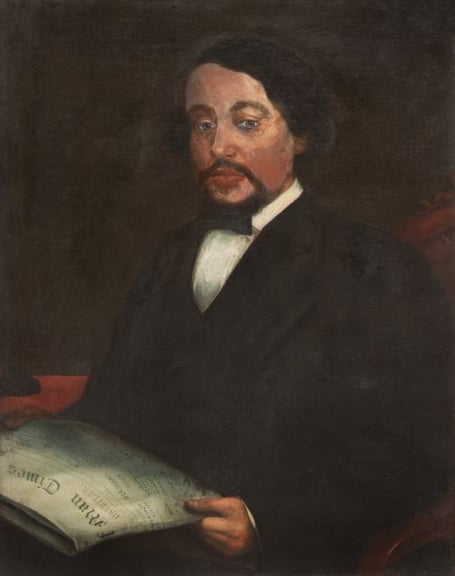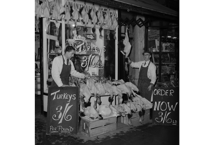Another White City feedback comment…
There was a strongman who lay in a prone position with an anvil on his chest. Customers would line up, sledgehammer in hand, to strike the object. Apparently, one enthusiast – a little worse for wear – did not hit the target full on. Instead, his blow struck the strongman.
A call went out to ask whether there was a doctor in the house. There wasn’t, but dentist Mr James, who was, attended immediately to the injury. The grateful strongman remained in touch as he continued his show elsewhere.
***
A recent caller to the Mannin Line asked why the new apartment development in Willaston is being named James Brown House. No, not that James Brown – and not former Chief Minister Tony Brown either.
This James Brown was born on August 2, 1815, in Liverpool. He was a British printer, editor and political activist. He moved to the Isle of Man in 1846, where he founded the Isle of Man Times newspaper and played an important role in the democratisation of the House of Keys.
Brown had previously worked as a compositor for Liverpool newspapers, and when he moved here it was to work on the National Reformer. At that time, the Isle of Man was home to many printing houses due in part to low taxes and a loophole that allowed newspapers printed on the Island to be sent to the UK free of postage. This ended in 1848, resulting in the closure of many presses.
Unemployed, Brown borrowed £30 and established his own printers in Duke Lane. He began publishing the Manx Lion, known for its ‘daring criticisms of local politics’, but the paper folded after just three months when, according to his son John, the advertising salesman walked off with most of the earnings.
The call for political reform had begun in the late 1700s but grew louder in 1833 when Robert Fargher launched the liberal and dissenting newspaper the Mona’s Herald. The paper became involved in a vigorous campaign to bring about a democratically elected House of Keys. Fargher argued that Keys’ meetings should be open to the press and public and that members should be chosen by popular vote.
His letters to the editor led to a libel action in 1844, resulting in his imprisonment in Castle Rushen. Supporters paid the fine, and the Mona’s Herald reported a triumphant procession back to Douglas.
On February 1, 1849, the first edition of Brown’s Advertising Circular was published. It was distributed freely and relied on advertising for income. Brown and his son later merged the publication into the Isle of Man Times and General Advertiser on May 4, 1861.
From its first issue, the Times set out a radical and independent tone: ‘Many reforms are needed in the machinery of the legislature and government of this Island, and we shall most strenuously urge these reforms upon the highest officials.’
The Isle of Man Times later published early verses by T. E. Brown, serialised his poem Betsy Lee, and ran novels by Hall Caine. The office of the Times and James Brown & Sons was at 9 Athol Street, Douglas.
In the early 1860s, Tynwald consisted of an appointed upper house, including the Governor, clergy and others, while the House of Keys was self-appointed. In 1863, Douglas Town Commissioners applied for more powers, but the Keys rejected the request.
Brown wrote critical articles that made him a champion of democratic rights while drawing the ire of the Keys. When one member suggested that the Commissioners should have powers over the donkeys on the beach, Brown published a remark saying the comment ‘elicited marks of approval from the donkeys around him’.
Following his reports, Brown was summoned before the House of Keys to answer a charge of contempt and breach of privilege.
He was not permitted to speak through his legal counsel, Alfred Adams, so addressed the House himself, reading lengthy passages from his newspaper in full. The House sentenced him to six months in prison and he was sent to Castle Rushen, where he kept a diary.
That same day, Mona’s Herald editor John Christian Fargher was also summoned but apologised and promised a retraction, avoiding imprisonment.
Adams later prepared a habeas corpus appeal to the Queen’s Bench, which ruled that the House of Keys did not have the power to imprison Brown for contempt.
On Saturday, May 7, after seven weeks in jail, Brown was released. He chose to stay an extra two days to allow time for his supporters to organise a welcome in Douglas. During his imprisonment, he received over 200 visitors and gifts from local businesses.
He later sued the House of Keys for wrongful imprisonment and was awarded £518, 19 shillings and sixpence – equivalent to over £55,000 today – plus costs.
Three years later, the House of Keys became a democratically elected body. In his 1901 Manx Worthies, A. W. Moore wrote that the name James Brown was usually associated with the reform of the House of Keys, alongside that of Robert Fargher, ‘for whom due recognition is also warranted’.
***
Are you a fan of Bonfire Night on November 5?
I am, though at the risk of sounding a spoil-sport, I prefer the colours and glittering displays to the constant loud bangs.
One of my last actions as a Tynwald member was to raise concerns about animal welfare. The Fireworks Act 2004 sets the age limit for buying fireworks at 18 and restricts when they can be bought – between October 25 and November 5.
They can only be used from the Friday two clear days before Bonfire Night until the Monday following it. Outside those dates, anyone holding a private display must notify the Fire Service and place a public notice in the newspaper stating when and where the display will be held – though this is not always followed.
This is important so that pet owners can take appropriate precautions. These protections reflect a society that encourages responsible enjoyment while promoting animal welfare.
Similar restrictions apply to displays held around New Year’s Eve.

.png?width=209&height=140&crop=209:145,smart&quality=75)


